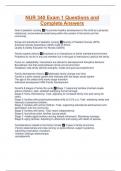NUR 340 Exam 1 Questions and
Complete Answers
Goal of pediatric nursing ✅To promote healthy development of the child as a physical,
intellectual, and emotional-social being within the context of the family and the
community
Scope and standards of pediatric nursing ✅Society of Pediatric Nurses (SPN)
American Nurses Association (ANA) Code of Ethics
Quality & Safety Education for Nurses (QSEN)
Family systems theory ✅Emphasis is on interactions of family members/environment
Problems do not lie in any one member but in the type of interactions used by the family
Focus on: adaptability: interactions are altered to decrease/omit disruptive behavior
Boundaries: line that exists between family and environment
Feedback: help family identify strengths, needs and goal accomplishment
Family development theory ✅Addresses family change over time
Family is a semi-closed system that interacts with the larger social system
The age of the oldest child marks stage transition
Individual development AND Family Development
Duvall's 8 stages of family life cycle ✅Stage 1: beginning families (married couple
without children), task- establish satisfying home/marriage.
Stage 2: Early child bearing. Task- adjusting to increased family size and caring for
infant.
Stage 3: families with preschoolers(oldest child is 2.5-6 y.o). Task- satisfying needs and
interests of preschool children.
Stage 4: families with school children. Task- supporting educational achievement and
assimilation into the community.
Stage 5: families with teens. Task: teach independence.
Stage 6: launching center families (young adult).
Stage 7: middle-aged families (moving toward retirement). Renewing marriage.
Stage 8: aging families. Adjusting to retirement and coping with death of spouse.
Considerations related to the family include ✅-Types of family structures
-Family relationships and roles (strong vs dysfunctional, support systems).
-parenting (motivation, transition)
-children (siblings relationships)
-grandparents
,The ____________ parenting style in which the parent is rigid overly strict, showing little
warmth to the child, high involvement, and strong discipline. ✅authoritarian
The ________ parenting style in which parents are warm, high standards of behaviors,
explanation and consistent enforcement of rules, and inclusion of children in decision
making. ✅authoritative
The _______ parenting style in which parents place few limits on the child's behavior,
high involvement, weak discipline. ✅permissive
The ________ parenting style in which there is a lack of parental involvement in the
child's life, low involvement, weak discipline. ✅neglectful (dismissive)
What is culture? ✅Way of Life that differs from race, religion & ethnicity. This can
impact parenting practices based on cultural factors such as:
Social roles
Culture shock
Cultural competence ✅Cultural awareness and sensitivity
Impact on verbal and non-verbal communication
Dietary considerations
Family centered healthcare ✅includes the family in the processes and procedures
involved in care in order to make them active members in the care (sometimes patients
want to be fed, diaper changed). In order to facilitate this you need to teach the family
about care so they can be involved.
Factors that influence our ability to provide family centered care ✅-socioeconomic
factors
-who cares for the child at home and how involved are they?
-desire of the family or caregiver to provide care to the child
-level of understanding of what is going on with the patient
Development is ✅Changes that take place over the lifetime of an individual
Physical and functional maturation
Growth can be viewed as a quantitative change and development as a qualitative
change
-qualitative increase in capability or function.
-Skills such as the ability to sit without support or throw a ball overhand.
Cephalocaudal development ✅head downward throughout the body and toward the
feet. At birth an infant's head is much larger than the rest of their body and they learn to
hold their head up first. Walking with the feet develops last in a child.
, Proximal distal development ✅center of the body, outward. Infants can first control
their trunk and then their arms.
What factors influence growth and development? ✅Heredity- child will be tall if parents
are
Nutritional status-lack of access to foods
Diseases and disorders
Socioeconomic status
Prenatal influences-alcohol during pregnancy, premature baby
Culture- family views on food and nutrition
Social networks & mass media-persuasion from the youth, obesity due to being on the
media, depression, anxiety.
Disorders that affect development- red flags ✅2 year old who talks holding onto the
couch, regressing to an earlier stage of development, motor skills not following as they
should.
Freud's ______ stage of psychosocial development refers to the time between birth and
1 year. At this stage, pleasures come from the ________ and sucking and eating are
the primary desires. ✅oral, mouth
Freud's _______ stage of development refers to the time between 1-3 years. At this
stage, pleasure is centered around the _______ area and control of _______ is a
primary force driving behavior. ✅anal, anal, body secretions
Freud's ______ stage of development refers to the period between 3-6. At this stage,
sexual energy becomes the center around the ______ as the child understands
similarities and differences with their parents. ✅phallic, genital
Freud's _______ stage of development refers to the period between 6-12. At this stage,
sexual energy is _______. ✅Latency, at rest
Freud's ________ stage of development refers to the period between 12-adulthood. At
this stage, ___________ is achieved. ✅Genital, sexual maturity
Trust vs mistrust ✅Birth-1 year: establish trust in the people providing care for you,
fostered by provision of food, clean clothing, touch, and comfort.
Acute care setting and parents can't visit, we need to provide care for the child
Autonomy vs shame and doubt: ✅1-3 years: controlling body excretions, saying no
when asked to do something shows their autonomy. Allow the time to feed themselves.
Safety is always a priority.
Initiative vs guilt: ✅-6 years: initiates new activities and considered new interests
Begin to make decisions, acting out, ask a lot of questions




